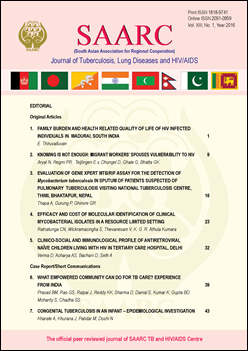Family Burden and Health Related Quality of Life of HIV Infected Individuals in Madurai, South India
DOI:
https://doi.org/10.3126/saarctb.v13i1.16922Keywords:
People Living with HIV/AIDS, ART, Health Related Quality of Life, Family BurdenAbstract
Introduction: With the advent of Highly Active Antiretroviral Therapy (HAART) in 1996, HIV-infected patients are living longer and are concerned not only with treatment’s ability to extend their life butalso with the quality of the life they are able to lead, because, efficacy of treatment is strongly relatedto meaningful outcome i.e., better Quality of Life. Especially Health related quality of life has not been studied well. Hence, this study was necessitated with the objectives to evaluate Health Related Quality of Life (HRQoL) in HIV infected persons on ART. The secondary objectives were to assess the family burden experienced by the families of HIV infected, and measure influence of family burden on overall quality of life.
Methodology: The HIV infected individuals who were started on treatment six months prior to date of interview were considered for the study The SF36 (Short Form with 36 questions) was used to evaluate function and mental Health while Pai and Kapur’s Family Burden Interview schedule was used to assess family burden. Interview schedule was pre-tested on 10 HIV infected individuals for consistency. Data analysis was performed using SPSS version 11 (SPSS inc. Chicago, IL, USA). Pearson product moment Correlation were computed to explore the relationships of SF36 with SLI, Family Burden and BMI. Further, Independent student “t” – test was performed to see the association between HRQoL and gender.
Results: Of 91 participants interviewed 51.6% were women. Median age (years) of the respondents was 33. The overall mean score for Physical health was 45.13 SD (12.40) and for Mental health 56.91 SD (15.52). Age of HIV infected persons had significant influence in scores in social functioning (p-value .015), emotional well being scores (.015), and Mental health (.010). Socio life Index was directly related to physical health, mental health, Vitality, social functioning and emotional scores on HRQoL. Physicalhealth score was negatively affected by the Family burden score. Similarly, BMI status of the respondents correlated with Mental health, Body Pain, Vitality and Role emotional scores of HRQoL scale SF 36.
Conclusion: Socio Life Index and BMI appear to be the two important predictors of HRQoL. Therefore, special attention may be required to HIV infected persons with lower SLI and BMI. Nutritional supplements, in addition to ART drugs, may be provided to ensure some improvements in physical functioning.
SAARC J TUBER LUNG DIS HIV/AIDS, 2016; XIII(1), Page: 1-8
Downloads
Downloads
Published
How to Cite
Issue
Section
License
Copyright © SAARC Tuberculosis and HIV/AIDS Centre (STAC), all rights reserved, no part of this publication may be reproduced, stored in a retrieval system or transmitted in any form or by any means without prior permission of the STAC.





